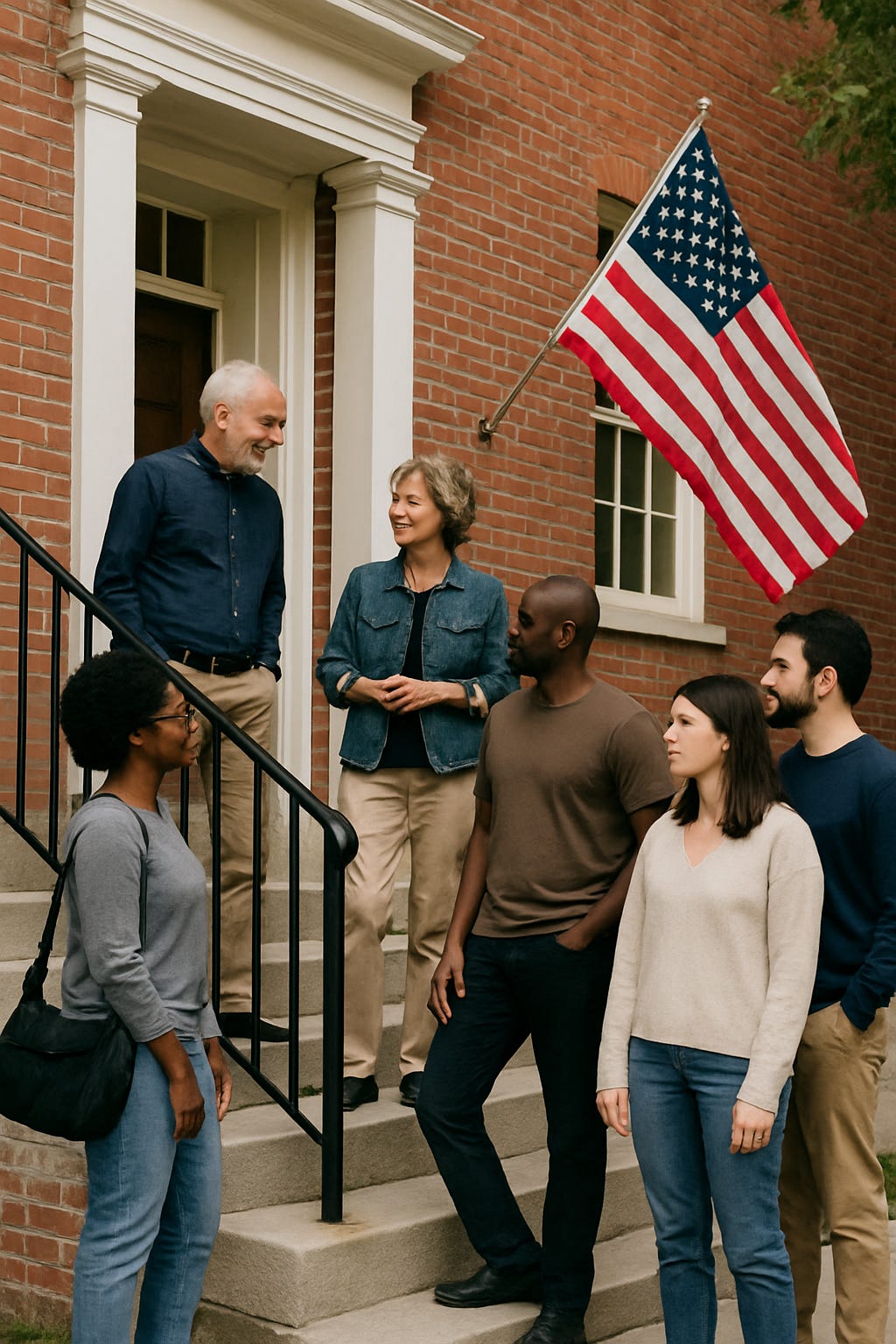✍️ Toward a More United State of Our American Community
Reclaiming the meaning of 'We the People'—starting right here at home
I wrote this opinion piece for the June 30 edition of The Jefferson County Beacon. I’m president of the board of directors for the nonprofit news outlet in Port Townsend, Washington.
What does Independence Day really celebrate?
Flags and patriotic music are part of it, sure. But behind the traditions and ceremony lies a quieter truth: the birth of a national community.
The United States was founded on a bold promise: that out of many people, places, and experiences, we could become one people. That promise still matters. But we must keep it alive.
I’ve been thinking for years about what it means to be part of a community in the United States — and here in Jefferson County.
We often think of community in small, personal ways: families, circles of friends, a church or club, our neighborhood. But Merriam-Webster defines community more broadly, as a "unified body of individuals."
Its definition includes:
A state or commonwealth —a politically organized body of people
People with common interests living in a particular area
A group linked by common policy, history, or profession
What struck me when I first looked up that definition years ago was the order. It didn’t start small. It started big—with the idea of the state, the country, our collective life.
It reminded me that community isn’t just about where we live. It’s also about how we live together.
At its smallest, a community can be a couple or a family. Despite the challenges many families face, most of us understand the value of those connections. We share goals, support each other, and navigate differences with care and compromise.
A group of friends, in person or on social media, can also be a community.
That same spirit extends outward. We experience community in reading groups, ancestry circles, unions, political parties, music scenes, and many more. We gain from one another’s knowledge and abilities.
We build things together that none of us could create by ourselves.
We haven’t lost all sense of community. But I fear we’ve lost sight of how much we rely on it, especially as our connections grow and become less visible.
In small groups, the give-and-take is clear. In larger ones, the benefits and responsibilities feel abstract. Easier to ignore. Easier to dismiss.
But our broader public community — the one we share as citizens — helps sustain all our other communities. The first-listed dictionary definition wasn’t about neighborhoods or clubs—it was about the state, our government, our democracy.
We have a public agreement to work together to solve problems. We count on it for safe water, public health, schools, roads, fair elections, and civil rights. None of us can secure those things alone.
Too often, we dishonor our shared institutions through neglect or cynicism, even as we benefit from them. A recent Pew survey found that only about one-third of Americans trust the federal government to do the right thing. That’s down from 77% in the 1960s.
If our public community grows too weak, those benefits won’t disappear overnight. But someone else might decide when we deserve them — with strings attached.
And those "someones" may not care one bit about our needs or the values of our local communities.
This isn’t a new concern. Our nation’s founders debated the balance between individual freedom and collective responsibility.
Lincoln warned that “a house divided against itself cannot stand.” Barack Obama reminded us: “We rise or fall as one nation, one people.”
Today, those ideals are being tested again. From Jefferson County to the halls of Congress, the idea of a shared public good—of community itself—is under pressure. Cuts to public libraries, health programs, and environmental protections signal a retreat from shared responsibility.
Here in Washington state, for example, federal grant cuts could cost the state library system as much as one-third of its budget — which would especially affect rural and underserved communities.
We’re fortunate to have local nonprofit organizations that carry forward the spirit of community: groups like KPTZ radio, the Olympic Community Action Programs (OlyCAP), and the Jefferson Land Trust. Volunteers come together with shared purpose and a commitment to the common good.
So, let’s celebrate not just our independence but also our interdependence. Politically active communities like ours give democracy its roots. They’re where the experiment either fails or flourishes. We all have a role to play.
And the example we set here can ripple outward, reminding other communities — from nearby counties to distant capitals — what’s possible when people commit to one another and the common good.
Being part of a community doesn’t mean giving up freedom. It means using our freedom to build something bigger, fairer, and more lasting, together.
I also recorded the commentary for airing on KPTZ-FM 91.9 Port Townsend.
Related Resources
A ranked guide to organizations shaping progressive change across Washington state
A ranked guide to organizations working for conservation, community, and justice on the Peninsula
A ranked guide to organizations promoting environmental justice and equity across the Puget Sound area
🏛️ Contacting Washington State Officials & Key Departments
🏛️ Contact Information: Washington's U.S. Senators and Representatives
Share
If my commentary resonates with you, please share it with friends.
Subscribe
Get new posts from Plainly, Garbl delivered to your inbox.


